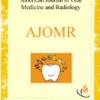Volume 8, Issue 2, 2021

Mcmed International
American Journal of Oral Medicine and Radiology
Issn
XXX-XXXX (Print),
2394 - 7721 (Online)
Frequency
bi-annual
Email
editorajomr@mcmed.us














